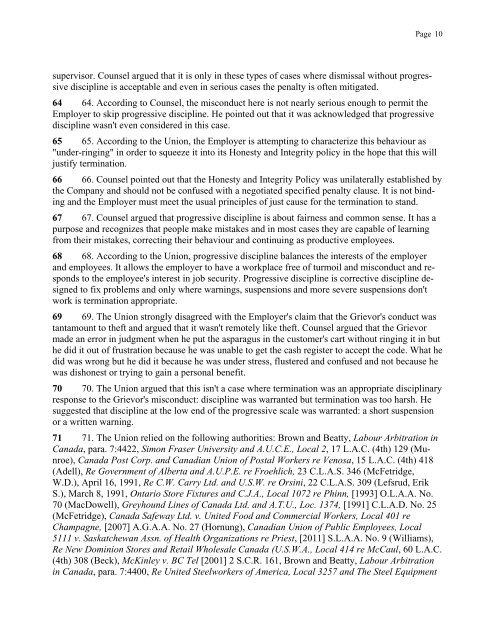FAQ's Cases - Stewart McKelvey
FAQ's Cases - Stewart McKelvey
FAQ's Cases - Stewart McKelvey
- No tags were found...
You also want an ePaper? Increase the reach of your titles
YUMPU automatically turns print PDFs into web optimized ePapers that Google loves.
Page 10supervisor. Counsel argued that it is only in these types of cases where dismissal without progressivediscipline is acceptable and even in serious cases the penalty is often mitigated.64 64. According to Counsel, the misconduct here is not nearly serious enough to permit theEmployer to skip progressive discipline. He pointed out that it was acknowledged that progressivediscipline wasn't even considered in this case.65 65. According to the Union, the Employer is attempting to characterize this behaviour as"under-ringing" in order to squeeze it into its Honesty and Integrity policy in the hope that this willjustify termination.66 66. Counsel pointed out that the Honesty and Integrity Policy was unilaterally established bythe Company and should not be confused with a negotiated specified penalty clause. It is not bindingand the Employer must meet the usual principles of just cause for the termination to stand.67 67. Counsel argued that progressive discipline is about fairness and common sense. It has apurpose and recognizes that people make mistakes and in most cases they are capable of learningfrom their mistakes, correcting their behaviour and continuing as productive employees.68 68. According to the Union, progressive discipline balances the interests of the employerand employees. It allows the employer to have a workplace free of turmoil and misconduct and respondsto the employee's interest in job security. Progressive discipline is corrective discipline designedto fix problems and only where warnings, suspensions and more severe suspensions don'twork is termination appropriate.69 69. The Union strongly disagreed with the Employer's claim that the Grievor's conduct wastantamount to theft and argued that it wasn't remotely like theft. Counsel argued that the Grievormade an error in judgment when he put the asparagus in the customer's cart without ringing it in buthe did it out of frustration because he was unable to get the cash register to accept the code. What hedid was wrong but he did it because he was under stress, flustered and confused and not because hewas dishonest or trying to gain a personal benefit.70 70. The Union argued that this isn't a case where termination was an appropriate disciplinaryresponse to the Grievor's misconduct: discipline was warranted but termination was too harsh. Hesuggested that discipline at the low end of the progressive scale was warranted: a short suspensionor a written warning.71 71. The Union relied on the following authorities: Brown and Beatty, Labour Arbitration inCanada, para. 7:4422, Simon Fraser University and A.U.C.E., Local 2, 17 L.A.C. (4th) 129 (Munroe),Canada Post Corp. and Canadian Union of Postal Workers re Venosa, 15 L.A.C. (4th) 418(Adell), Re Government of Alberta and A.U.P.E. re Froehlich, 23 C.L.A.S. 346 (McFetridge,W.D.), April 16, 1991, Re C.W. Carry Ltd. and U.S.W. re Orsini, 22 C.L.A.S. 309 (Lefsrud, ErikS.), March 8, 1991, Ontario Store Fixtures and C.J.A., Local 1072 re Phinn, [1993] O.L.A.A. No.70 (MacDowell), Greyhound Lines of Canada Ltd. and A.T.U., Loc. 1374, [1991] C.L.A.D. No. 25(McFetridge), Canada Safeway Ltd. v. United Food and Commercial Workers, Local 401 reChampagne, [2007] A.G.A.A. No. 27 (Hornung), Canadian Union of Public Employees, Local5111 v. Saskatchewan Assn. of Health Organizations re Priest, [2011] S.L.A.A. No. 9 (Williams),Re New Dominion Stores and Retail Wholesale Canada (U.S.W.A., Local 414 re McCaul, 60 L.A.C.(4th) 308 (Beck), McKinley v. BC Tel [2001] 2 S.C.R. 161, Brown and Beatty, Labour Arbitrationin Canada, para. 7:4400, Re United Steelworkers of America, Local 3257 and The Steel Equipment
















